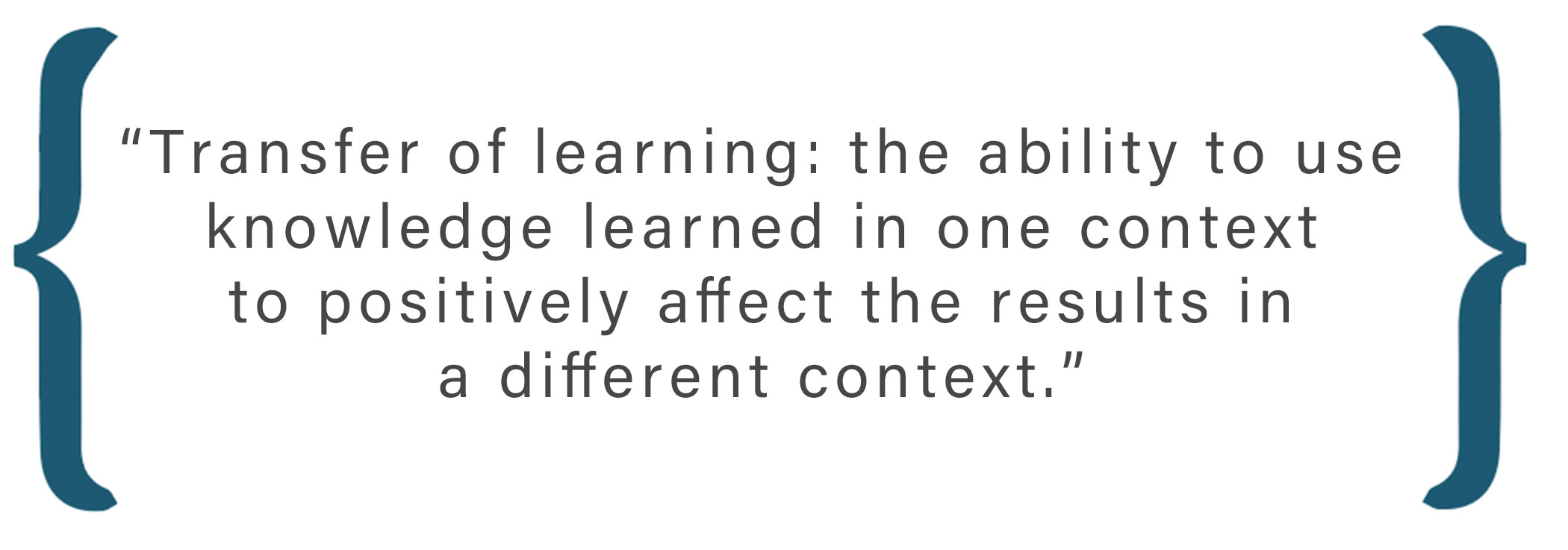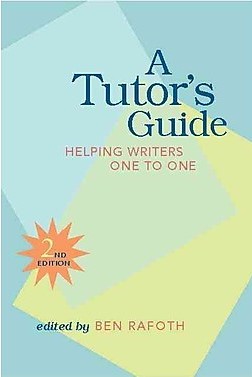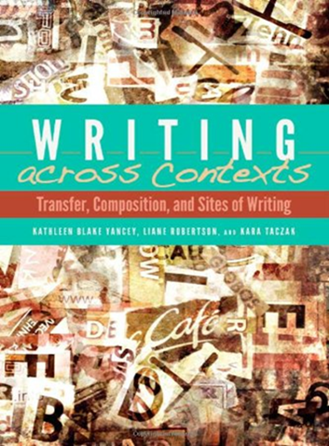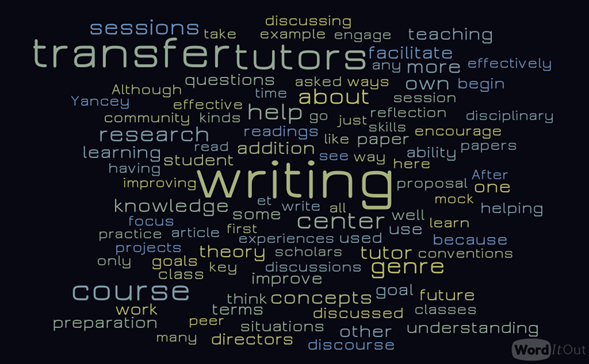
CHAPTER THREE
Strategies for Creating a Transfer-Focused
Tutor Education Program
TRANSFER OF LEARNING IN THE WRITING CENTER
Heather N. Hill
Northwest Missouri State University

 Transfer scholars David Perkins and Gavriel Salomon argue that transfer often needs to be "cued, primed, and guided" to be successful (19). Transfer, the ability to use knowledge learned in one context to positively affect the results in a different context, has been shown to be a complex and difficult process that does not happen automatically. However, there are ways to make transfer easier and more effective for students. Recently, scholars have begun to see the writing center as an ideal place for students to receive the prompting and guidance needed in order to transfer their learning more effectively and more often, and so they have begun to investigate the writing center as a crucial site for the facilitation of transfer (Devet; Hagemann; Hill). In "Tutoring for Transfer: The Benefits of Teaching Writing Center Tutors about Transfer Theory," I argue that if directors want writing center tutors to help their students transfer their knowledge, those tutors must be taught how to do so. My study indicates that although a one-hour educational session on transfer theory has a positive effect, it is not enough to equip tutors with the requisite knowledge to successfully facilitate transfer. I argue that transfer theory as well as genre theory should take a more central place in tutor preparation. This chapter serves as a follow up to that article because, while my article shows the potential of writing centers as sites to help students negotiate transfer, it does not allow me the space to discuss strategies that would help directors prepare tutors for that work. Therefore, in this chapter, I discuss my tutor preparation course that is designed to teach tutors transfer theory as well as how to use concepts from genre theory to help them effectively facilitate the transfer of writing-related knowledge.
Transfer scholars David Perkins and Gavriel Salomon argue that transfer often needs to be "cued, primed, and guided" to be successful (19). Transfer, the ability to use knowledge learned in one context to positively affect the results in a different context, has been shown to be a complex and difficult process that does not happen automatically. However, there are ways to make transfer easier and more effective for students. Recently, scholars have begun to see the writing center as an ideal place for students to receive the prompting and guidance needed in order to transfer their learning more effectively and more often, and so they have begun to investigate the writing center as a crucial site for the facilitation of transfer (Devet; Hagemann; Hill). In "Tutoring for Transfer: The Benefits of Teaching Writing Center Tutors about Transfer Theory," I argue that if directors want writing center tutors to help their students transfer their knowledge, those tutors must be taught how to do so. My study indicates that although a one-hour educational session on transfer theory has a positive effect, it is not enough to equip tutors with the requisite knowledge to successfully facilitate transfer. I argue that transfer theory as well as genre theory should take a more central place in tutor preparation. This chapter serves as a follow up to that article because, while my article shows the potential of writing centers as sites to help students negotiate transfer, it does not allow me the space to discuss strategies that would help directors prepare tutors for that work. Therefore, in this chapter, I discuss my tutor preparation course that is designed to teach tutors transfer theory as well as how to use concepts from genre theory to help them effectively facilitate the transfer of writing-related knowledge.
My course is a 300-level, 1-credit course that is taken by both undergraduate and graduate students who are in their first semester of tutoring. Because my course is only one credit, the strategies I discuss here can be adapted for writing centers that use weekly meetings or other forms of tutor professional development. In addition, many of the readings and classroom activities discussed here can be easily added to an already successful three-credit course.
Goals of the Course
My tutor preparation course combines some of the approaches to teaching for transfer used in composition classes, in particular Elizabeth Wardle and Doug Downs' Writing about Writing: A College Reader, Amy Devitt's "Genre Awareness" (described in Writing Genres), and Kathleen Blake Yancey, Liane Robertson, and Kara Taczak's1 "Teaching for Transfer" (described in Writing Across Contexts). This course also takes up Kristin Walker's call to use genre theory as the basis for tutor preparation courses. She argues that genre theory provides tutors "with a tool to analyze discipline-specific discourse" (28) and that it can "only strengthen writing center theory and practice by empowering tutors and facilitating writers learning the discourses of their field" (38). In addition, my course has two other important goals: Helping tutors come to a more accurate and complex understanding of writing (and thus aiding them learn in transferring their own learning), and improving tutors' ability to evaluate and give useful feedback on writing (See Appendix for full syllabus.). These objectives can be reached through a course focusing on transfer because the ability to facilitate transfer begins with understanding key concepts that encourage transfer and knowing how writing works both within and outside the university (Yancey, Robertson, and Taczak). These concepts are keys to both improving one's own writing and helping others improve theirs. As argued by Dana Lynn Driscoll, not only is a transfer-focused course an effective way to prepare tutors for the writing center but it can also help improve tutors' own writing, interpersonal communication skills, and metacognitive skills. Therefore, focusing on transfer can be a way of working toward all the above-stated goals. In addition, the course uses Ben Rafoth's A Tutor's Guide: Helping Writers One to One as the textbook that introduces students to the kinds of situations they may encounter in the writing center.
 |
| Figure 1. A Tutor's Guide. |
Rather than going through my syllabus step-by-step, the focus of this chapter is to give some strategies for helping tutors gain a more accurate and sophisticated understanding of how writing works, so that they can learn not only to facilitate transfer in their writing center sessions, but also to transfer their own learning successfully. These strategies can be integrated into tutor preparation courses or can be used in other tutor preparation scenarios, such as workshops or weekly staff meetings.
Improving Tutors' Understanding of Writing
 |
| Figure 2.Writing Across Contexts. |
In Yancey et al.'s "Teaching for Transfer" approach to writing instruction (which they describe in detail in Writing Across Contexts), a major part of improving students' writing is helping them acquire a more effective conception of writing. In addition, helping tutors have a more accurate understanding of how writing works is essential to improving their tutoring and facilitating transfer. To accomplish this goal, I ask students to read texts that help them gain a broader understanding of how writing works both within and outside the university. To introduce new tutors to our approach in the center, at our orientation we discuss the introduction to Wardle and Down's Writing about Writing. During the semester, in addition to Rafoth's textbook, students read texts such as Lucille McCarthy's "A Stranger in Strange Lands," Devitt's "A Proposal for Teaching Genre Awareness" (from Writing Genres), and Ann Johns' "Discourse Communities and Communities of Practice" (from Text, Role, and Context). Our discussions of these readings focus on giving students knowledge about concepts, such as genre, discourse community, transfer, the context-dependent nature of writing, the social nature of writing, writing across the curriculum, disciplinary writing conventions, and rhetorical situations, all of which help them gain a more accurate conception of writing, and help them to understand how to transfer their own writing knowledge more effectively. In addition, I want tutors to move away from the idea that "good writing" and "good grammar" are synonyms, especially because our center does not edit papers and does not focus on grammar.
I expect that new tutors are already strong writers and that through the course readings, tutors gain an even broader understanding of writing that helps them improve their own writing by encouraging them to learn to transfer their own learning. Even adding a discussion of one or two of the above texts would help students think about writing in broader ways than they might have. Because their tutor education course is often the first introduction to writing center theory and composition studies, these kinds of texts help new tutors understand writing more effectively.
Facilitating Transfer
 The above-mentioned readings also assist in laying the foundation for the major goal of the course: teaching tutors to assist students with transfer. Having a sophisticated understanding of writing enhances tutors' ability to facilitate transfer because they can more accurately use writing concepts that encourage transfer (Yancey et al.; Beaufort; Wardle). Therefore, along with the texts mentioned above, students also read portions of Yancey et al.'s Writing Across Contexts, Mary Jo Reiff and Anis Bawarshi's "Tracing Discursive Resources," Bonnie Devet's "The Writing Center and Transfer of Learning," and Dana Lynn Driscoll's "Building Connections and Transferring Knowledge." These readings build on the concepts learned in the first few readings but focus more exclusively on transfer. New tutors learn about transfer in detail, and class discussions of these texts focus on how tutors can use that information to help encourage transfer in their tutoring sessions. For example, these texts suggest that transfer is more likely if students 1) are taught key vocabulary about writing—abstract writing concepts that go beyond any one writing situation and give students the ability to describe their writing experiences accurately; 2) are engaged in systematic reflective practices encouraging metacognition at all stages of the writing process; and 3) are helped to create a more accurate conception of what writing is and how writing works. These goals correspond to the goals of my course but can also be used when organizing tutoring sessions. Tutors cannot possibly expect to accomplish all these goals in one tutoring session. However, if they are working to assist with transfer, they should attempt some of them. In our center, tutoring sessions are scheduled for only 20 minutes, although students can always stay longer if they need more time (and they often do). Even though we might not have much time with each student, tutors can still contribute to students' conception of writing by focusing on key concepts and encouraging reflection.
The above-mentioned readings also assist in laying the foundation for the major goal of the course: teaching tutors to assist students with transfer. Having a sophisticated understanding of writing enhances tutors' ability to facilitate transfer because they can more accurately use writing concepts that encourage transfer (Yancey et al.; Beaufort; Wardle). Therefore, along with the texts mentioned above, students also read portions of Yancey et al.'s Writing Across Contexts, Mary Jo Reiff and Anis Bawarshi's "Tracing Discursive Resources," Bonnie Devet's "The Writing Center and Transfer of Learning," and Dana Lynn Driscoll's "Building Connections and Transferring Knowledge." These readings build on the concepts learned in the first few readings but focus more exclusively on transfer. New tutors learn about transfer in detail, and class discussions of these texts focus on how tutors can use that information to help encourage transfer in their tutoring sessions. For example, these texts suggest that transfer is more likely if students 1) are taught key vocabulary about writing—abstract writing concepts that go beyond any one writing situation and give students the ability to describe their writing experiences accurately; 2) are engaged in systematic reflective practices encouraging metacognition at all stages of the writing process; and 3) are helped to create a more accurate conception of what writing is and how writing works. These goals correspond to the goals of my course but can also be used when organizing tutoring sessions. Tutors cannot possibly expect to accomplish all these goals in one tutoring session. However, if they are working to assist with transfer, they should attempt some of them. In our center, tutoring sessions are scheduled for only 20 minutes, although students can always stay longer if they need more time (and they often do). Even though we might not have much time with each student, tutors can still contribute to students' conception of writing by focusing on key concepts and encouraging reflection.
When it comes to key concepts that help encourage transfer, scholars have focused on the terms genre, reflection/metacognition, audience, rhetorical situation, exigence, discourse community, disciplinary knowledge, and context (Yancey et al.; Beaufort; Devitt). These terms also correspond to what scholars call the "threshold concepts" for writing studies (Adler-Kassner and Wardle; Meyer and Land)—the core concepts in a field that transform a newcomer's understanding of that field—and are the same concepts that tutors themselves learn in my course. After getting a firm understanding of these terms, we discuss how to use them in tutoring sessions. Obviously, tutors cannot talk about all of the terms in any one tutoring session, but they can discuss one or two, depending on what they think would be most useful to the particular student. For example, tutors could talk about discourse community and genre, specifically discussing the importance of using the genre conventions appropriate to the discourse community for which students are writing, making sure that students grasp these abstract concepts in addition to understanding the specific genre conventions for the paper they brought with them.
 At the end of each class discussion, we generate questions tutors can ask students in their tutoring sessions. For example, after reading Devitt's "A Proposal for Teaching Genre Awareness," we discuss asking students what genre they are writing, what the conventions of that genre are, whether they have ever written that genre before, how that genre is similar to or different from other papers they have written, etc. After every class period, I write the questions on the white board in our center so that tutors are reminded to ask those kinds of questions in their sessions. More specifically, if a student comes to the center with a literary analysis paper from a literature class, tutors might use the questions listed below. (See table 1) When answering these kinds of questions, students reflect on their own knowledge as well as think about abstract concepts that go beyond the current paper they are writing. In addition, abstract terms like genre encourage transfer, because they are not situation-specific but are applicable across the board to any writing that students may complete in the future (forward-thinking transfer).
At the end of each class discussion, we generate questions tutors can ask students in their tutoring sessions. For example, after reading Devitt's "A Proposal for Teaching Genre Awareness," we discuss asking students what genre they are writing, what the conventions of that genre are, whether they have ever written that genre before, how that genre is similar to or different from other papers they have written, etc. After every class period, I write the questions on the white board in our center so that tutors are reminded to ask those kinds of questions in their sessions. More specifically, if a student comes to the center with a literary analysis paper from a literature class, tutors might use the questions listed below. (See table 1) When answering these kinds of questions, students reflect on their own knowledge as well as think about abstract concepts that go beyond the current paper they are writing. In addition, abstract terms like genre encourage transfer, because they are not situation-specific but are applicable across the board to any writing that students may complete in the future (forward-thinking transfer).
Table 1
Questions to Ask about Transfer
In addition, by asking students to reflect on their learning, tutors can help them perceive the connections between learning situations, thus making transfer more likely. Tutors can ask students to think about their previous learning and how that learning is similar to or different from the learning they are currently engaged in. Students should also look towards future writing situations and discuss how what they are currently learning may be useful later. Tutors can engage students in these kinds of discussions by asking questions, such as:
- Have you ever written a paper like this before?
- How is this similar to or different from papers you have written in the past?
These kinds of questions can then lead to the questions about genre and disciplinary writing conventions discussed above. In addition, tutors can engage students in forward-thinking reflection (Perkins and Salomon) by asking questions, such as:
- How is this assignment like things you might write in other courses?
- How might you use what you are learning in future classes?
- How do you think the concept of genre might be helpful to you in future writing situations?
Through these kinds of questions, tutors engage students in metacognitive reflection that helps students think about how their learning goes beyond individual situations; thus, they are more likely to transfer not only the knowledge they are gaining in their classes but also the knowledge acquired in their writing center session.
Reflecting on Transfer
My course also includes four short reflection papers based on tutors' experiences in the writing center. First, new tutors observe experienced tutors working with clients in the writing center, and, then, new tutors begin tutoring themselves, and they write reflections on both of these experiences. They write a total of four of these papers, two on their observations and two on their own experience tutoring. These two-to-three page papers are intended to connect to the readings we do in class, especially to the issue of transfer. Although these kinds of reflection papers are often used in tutor education courses, the focus of our papers is on transfer. When observing other tutors, new tutors are asked to think about how the experienced tutors are helping to facilitate transfer or how those tutors may have been able to do so more effectively. The goal is not necessarily to critique but just to observe and make connections to our course content. For instance, one new tutor may observe an experienced tutor discussing a disciplinary genre with a client. That new tutor might write about how the experienced tutor used a key term like genre and how he or she discussed the disciplinary nature of writing. Conversely, they might also point out that the tutor never defined the term genre for the client but instead just used the term as if the client already knew it, which may have caused confusion for the client. Having said that, I understand that transfer-related topics are only one area of focus in any writing tutorial; many times, tutors being observed may not be having those kinds of discussions. However, because our center does have a transfer focus, I want new tutors to think about how experienced tutors may have been able to add those kinds of conversation points.
These observations and reflections help new tutors see how experienced tutors attempt to encourage transfer, so that they can apply those techniques in their own sessions. They are, then, asked to work on facilitating transfer in their own tutoring sessions and to reflect on these sessions. I ask them to think about what went well in the session and why, as well as what did not go as planned and how they might do better the next time. They are asked to connect these discussions to the readings we have done in class. Again, the focus may end up being topics other than transfer, but I try to encourage them to keep transfer in the front of their minds as much as possible.
Final Thoughts
Although my main focus in the training course is helping tutors learn to facilitate transfer, I understand transfer is not the only topic tutors need to know. Therefore the course does discuss many additional topics as we work through Rafoth's text. Even so, the focus on transfer does mean that I have to leave other things out. However, I think that the benefits of adding in discussions of transfer outweigh the negatives and that much of what I have been discussing here can be added into existing introductory courses for tutors in productive ways that will help improve their tutoring practice. In addition, if writing center transfer scholarship is correct, then focusing on transfer helps new tutors gain knowledge that would not only help them become effective tutors but also aid them in many of their future endeavors whether they go on to be writing teachers or not (Driscoll).
 |
| Figure 3. Focusing on Transfer. |
While it seems clear that tutors should have a strong grasp of transfer and genre theory to productively facilitate transfer, the strategies provided here await future research as to their effectiveness. Although my previous research shows that just one hour of this kind of education has a positive effect, more research is needed to determine the effects of an entire course dedicated to teaching tutors to facilitate transfer. In addition, I understand that many writing centers do not require their tutors to take a course. Therefore, I want to end by discussing a couple of options for adapting these strategies for other types of educational scenarios.
First, if directors use one-hour staff meetings or a pre-service orientation to prepare their tutors and would like to add discussions of transfer, they can use a workshop similar to the one I discussed in "Tutoring for Transfer: The Benefits of Teaching Tutors about Transfer Theory." This workshop does not require students to read or prepare anything ahead of time, so it can be used at any point in a semester. In addition, to help tutors gain a broader, more sophisticated understanding of how writing works, many of the readings discussed in this chapter can be used individually. For example, if directors have weekly staff meetings, maybe once a month tutors could read an article and spend the meeting discussing how its ideas might affect their tutoring. Any of the articles or book chapters mentioned here could be used. In addition, the following are some examples of discussion questions and class/workshop activities that can help improve students' understanding of transfer and how it can be used in their tutoring sessions:
Questions for Discussion
After tutors read texts about transfer and writing center studies, the following discussion questions can be used:
1. What is transfer of learning? What does it mean to facilitate transfer?
2. How might the concept of transfer of learning change the way you approach tutoring sessions in the future?
3. What are some specific ways you can apply some of these ideas in your sessions?
4. Which key terms about writing (genre, discourse community, reflection, the disciplinarity of writing, etc.) do you find the most useful and why? How might you use those terms to help your students transfer their knowledge more effectively?
5. Do you think doing this kind of work is difficult? Why or why not? What makes it difficult?
6. How might this kind of work affect the students who come to the writing center? What are the benefits of focusing on transfer in the writing center?
Ideas for Classroom Activities
1. Have students practice conducting tutoring sessions, specifically attempting to facilitate transfer by asking each other to reflect on previous learning or by discussing some of the abstract concepts about writing discussed here. Then, have a discussion about how that went: What went well, what they might try to do differently next time, etc.
2. Ask students to work in groups to create a resource file that gives a practical suggestion for how to use one of the ideas related to transfer in tutoring sessions.
3. Have students give informal presentations about the writing conventions and typical genres used in their majors, and then focus the discussion on the similarities and differences between the disciplinary writing conventions in the different majors represented. Follow up with a discussion about how this comparison might affect the ways they approach their tutoring sessions.
4. Show some of the following videos that help explain transfer, and allow time for discussion:
Overall, I believe transfer-focused tutor preparation in any form can help students develop as writers, as interpersonal communicators, as teachers, and as tutors. Therefore, I suggest adding discussions of transfer theory and genre theory into the tutor preparation your writing center uses.
NOTES
1 (back to text)
What I am discussing here is similar to the "dual lens" that Bowen and Davis discuss in their chapter, "Teaching for Transfer and the Design of a Writing Center's Education Program" in this volume. They argue that it is often a challenge for tutors to "simultaneously develop their own writing knowledge and practice and develop and employ tutoring strategies to guide others' learning transfer" and that this challenge "requires tutors to develop agile reflective practices, toggling between the views of themselves and of others." See Bowen and Davis' chapter in this volume for more information.
Works Cited
Aldler-Kassner, Linda, and Elizabeth Wardle. Naming What We Know: Threshold Concepts of
Writing Studies. UP of Colorado, 2015.
Beaufort, Anne. College Writing and Beyond: A New Framework for University Writing
Instruction. Utah State UP, 2007.
Center for Engaged Learning. "Studying Writing Transfer: Tips for Scholars New to Transfer Studies." YouTube, uploaded by Center for Engaged Learning at Elon University, 11 July 2013. https://www.youtube.com/watch?v=gSpcdNRKD1M.
---. "Studying Writing Transfer: Disciplinary Theories and Reading Recommendations." YouTube, uploaded by Center for Engaged Learning at Elon, 11, July 2013, https://www.youtube.com/watch?v=k_rf1MOeUTc.
---. "Motivations for Studying Writing Transfer." YouTube, uploaded by Center for Engaged Learning at Elon 11 July 2013, https://www.youtube.com/watch?v=Xx948XNA3N0.
---. "What is Transfer?" YouTube, Uploaded by Center for Engaged Learning at Elon University, 2 Sept.2013, https://www.youtube.com/watch?v=JQ9150hgnEI.
---. "Studying Transfer—Relevant Theories of Learning." YouTube, Uploaded by Center for Engaged Learning at Elon University, 11 Sept. 2013, https://www.youtube.com/watch?v=853n57Dfb7Y.
Devet, Bonnie. "The Writing Center and Transfer of Learning: A Primer for Directors." The Writing
Center Journal, vol. 35, no. 1, Fall/Winter 2015, pp. 119-51.
Devitt, Amy. Writing Genres. Southern Illinois UP, 2004.
Driscoll, Dana Lynn. "Building Connections and Transferring Knowledge: The Benefits of a
Peer Tutoring Course beyond the Writing Center." Writing Center Journal, vol. 35, no. 1, Fall/Winter 2015, pp. 153-81.
Hagemann, Julie. "Writing Centers as Sites for Writing Transfer Research." Writing Center
Perspectives. Edited by Byron L. Stay, Christine Murphy, and Eric Hobson. National Writing Center Association, 1995, pp. 120-31.
Hill, Heather N. "Tutoring for Transfer: The Benefits of Teaching Writing Center Tutors about
Transfer Theory." The Writing Center Journal, vol. 35, no. 3, 2016, pp. 77-104.
Johns, Ann. Text, Role and Context: Developing Academic Literacies. Cambridge UP, 1997.
McCarthy, Lucille Parkinson. "A Stranger in Strange Lands: A College Student Writing
Across the Curriculum." Research in the Teaching of English, vol. 21, no. 3, 1987, pp. 233-65.
Meyer, Jan, and Ryan Land. Understanding Barriers to Student Understanding: Threshold
Concepts and Troublesome Knowledge. Routledge, 2006.
Perkins, D. N., and Gavriel Salomon. "Are Cognitive Skills Context-Bound?." Educational
Researcher, vol. 18, no. 1, 1989, pp. 16-25.
Rafoth, Ben. A Tutor's Guide: Helping Writers One to One. Boynton/Cook Publishing, 2005.
Reiff, Mary Joe, and Anis Bawarshi. "Tracing Discursive Resources: How Students Use Prior
Genre Knowledge to Negotiate New Writing Contexts in First-Year Composition." Written Communication, vol. 28, no. 3, 2011, pp. 312-37.
Walker, Kristin. "The Debate Over Generalist and Specialist Tutors: Genre Theory's
Contribution." The Writing Center Journal, vol. 18, no. 2, 1998, pp. 26-46. https://www.jstor.org/stable/43442046?seq=1#page_scan_tab_contents.
Wardle, Elizabeth, and Doug Downs. Writing about Writing: A College Reader. 3rd ed., MacMillan, 2017.
Wardle, Elizabeth. "Creative Repurposing for Expansive Learning: Considering 'Problem-
Exploring' and 'Answer-Getting' Dispositions in Individuals and Fields." Composition Forum, vol. 26, 2012. http://compositionforum.com/issue/26/creative-repurposing.php.
Yancey, Kathleen Blake., Liane Robertson, and Kara Taczak. Writing Across Contexts:
Transfer, Composition, and Sites of Writing. UP of Colorado, 2014. https://upcolorado.com/utah-state-university-press/item/2365-writing-across-contexts.
BIO
Heather N. Hill is the past writing center director and current composition director at Northwest Missouri State University, where she teaches courses in composition, writing pedagogy, and sociolinguistics. Her research focuses on the application of rhetorical genre theory and transfer theory to composition pedagogy and writing center tutoring sessions.